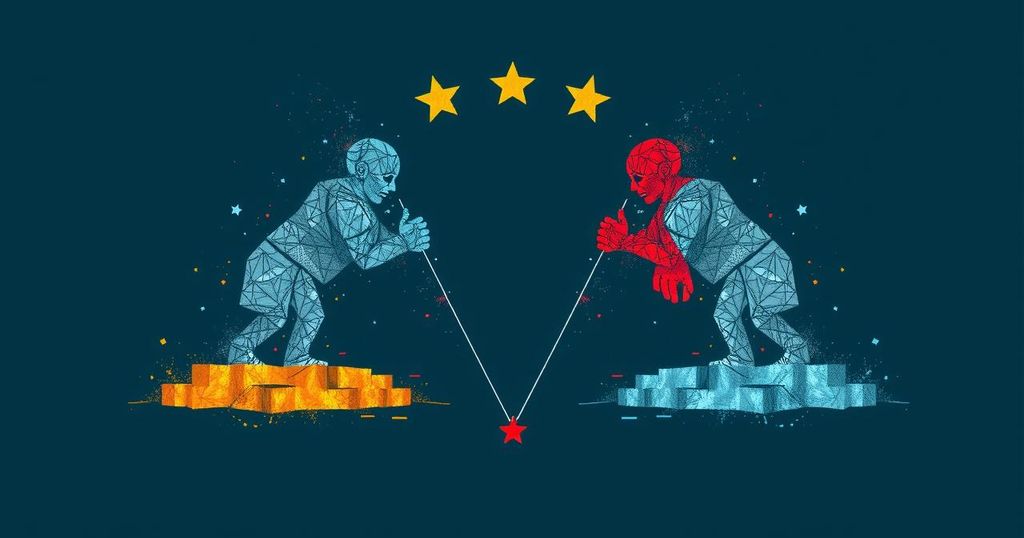Global news
AFRICA, AM, CHARLES TAI GITUAI, CONFLICT RESOLUTION, GITUAI, GOVERNMENT OF NATIONAL UNITY, INTERNATIONAL RELATIONS, JOINT MONITORING AND EVALUATION COMMISSION, JUBA, RECONSTITUTED JOINT MONITORING AND EVALUATION COMMISSION, REGIONAL COOPERATION, RJMEC, RTGONU, SOUTH SUDAN, TRANSITIONAL GOVERNMENT
Marcus Li
0 Comments
Barriers to Peace Implementation in South Sudan: Insights from RJMEC Meeting
The RJMEC has identified trust deficits, a lack of political will, and inadequate funding as major challenges to the implementation of South Sudan’s peace agreement, urging the government to demonstrate commitment through resource mobilization and increased women’s representation in leadership roles.
The Reconstituted Joint Monitoring and Evaluation Commission (RJMEC) has identified several significant barriers hindering the implementation of the peace agreement in South Sudan, including a notable lack of political will, trust deficits among parties, inadequate funding, and capacity deficiencies. During the RJMEC’s 38th monthly meeting in Juba, Chairperson Ambassador Maj. Gen. Charles Tai Gituai emphasized the urgent need for the Revitalized Transitional Government of National Unity (RTGoNU) to showcase its commitment by mobilizing adequate resources for effective agreement execution. Ambassador Gituai articulated that aligning the RTGoNU’s initiatives with the essential tasks outlined in the transitional period—such as instituting action plans, budgeting, and resource allocation—is critical to revitalizing the peace process. He asserted that securing reliable funding and making tangible progress will send a strong message of accountability and commitment to the citizens of South Sudan, potentially enhancing international support for the peace initiative. Moreover, he cautioned against the potential pitfalls of perpetuating an unending cycle of transitions, reinforcing the necessity for strategic planning and prompt action.Gituai called for expeditious implementation of crucial outstanding tasks including constitution-making, electoral preparations, and the unification of forces, emphasizing the importance of consensus and urgency observed during the transitional period’s extension. Furthermore, Ambassador Gituai highlighted the essential role of women in the peacebuilding process, advocating for increased representation within both the executive and legislative bodies, surpassing the established 35 percent threshold. He reiterated the significance of women’s involvement in achieving lasting peace and security in South Sudan and urged that such representation must not diminish with any future appointments.
The implementation of the South Sudan peace deal remains fraught with challenges, as expressed by RJMEC during its recent meeting. The peace agreement, which aimed to stabilize South Sudan following years of conflict, has yet to realize its full potential due to persistent issues such as the lack of trustworthy political commitments and insufficient financing for peace initiatives. RJMEC is tasked with overseeing the peace implementation process, requiring effective collaboration amongst various political entities in South Sudan. With an emphasis on the need for decisive actions and resource mobilization, RJMEC plays a critical role in advocating for a cohesive approach to ensure successful governance and social reconciliation, especially highlighting the inclusion of women in leadership positions within the political landscape of South Sudan.
In summary, the RJMEC has underscored critical issues affecting the successful implementation of the South Sudan peace agreement, particularly highlighting political inertia, funding deficiencies, and the vital need for increased women’s representation. Ambassador Gituai’s insights reflect a call for urgent reforms and resource mobilization to demonstrate political commitment and facilitate a stable governance framework. Effective execution of the peace agreement is contingent upon collaborative efforts, driven by a sense of urgency and a shared vision of reconciliation and unity among the diverse parties involved.
Original Source: sudantribune.com




Post Comment